182 Search Results for asha
December 11, 2012
by Carole Zangari -
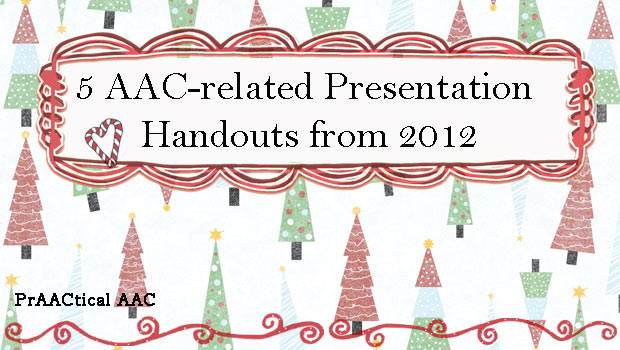
One of our deepest holiday wishes is that every AAC-loving clinician could have an increased travel budget for professional development. Until then, here are some handouts from AAC presentations at conferences around the US. From the ISAAC Biennial Conference in Pittsburgh: Effects of Early AAC Intervention for Children with Down Syndrome by Janice Light and Kathryn Drager This was a well-attended session by Jane Korsten & Terry Foss at ISAAC 2012: Assessment Strategies for Individuals with Sensorimotor Differences Wish I could have been at Deanna Wagner’s session at ARSHA on AAC for Students with Visual and Multiple Disabilities: How to Plan and Implement a Successful AAC Treatment of Childhood Apraxia of Speech: A Checklist for Evidence-based Practice by Sue Caspari at the 2012 ASHA Schools Conference Theresa Bartolotta & Patricia Remshifski’s ASHA session on Communication & Swallowing in Rett Syndrome: An Update for Clinicians
December 3, 2012
by Carole Zangari -
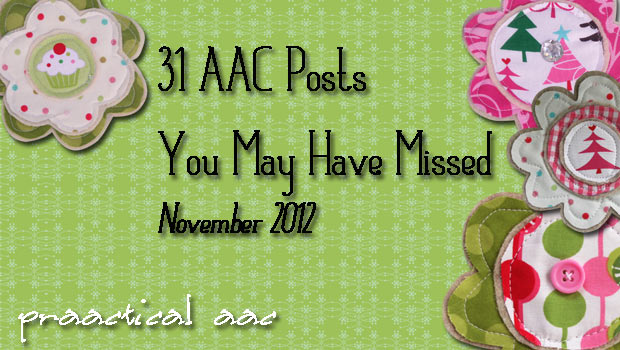
PrAACtically Thinking PrAACtically Unfair: Why People Who Use AAC Sometimes Fail Tests It’s PrAACtically Chanukkah! Let’s Get Specific About Speech Intelligibility Thankful Funny Bones: Jokes for Sequential Message Devices/Apps Vocabulary Learning Materials & AAC Strategies Choosing a Focus for Vocabulary Instruction Vocabulary Learning Using Infographics Say THIS, NOT THAT to Reinforce Vocabulary Learning How to Use Magnets to Promote Language Development Vocabulary Activities: 5 Sites for Learning with Avatars What Makes a Good Vocabulary Teaching Activity? 4 Things to Look For Simple Start: Visual Supports for Places We Go 10 Things to Do in Using Focused Language Stimulation in AAC Vocabulary Teaching Tell Me About It: Focused Language Stimulation In AAC Vocabulary Teaching A Word About Word Order Avaz AAC App & Vocabulary Learning Magic Moments with Sentence Builder AAC Awareness Month Wrap-Up Strategy of the Month Complete Vocabulary Instruction Ideas & Activities Explicitly Speaking: Vocabulary Teaching in AAC Building... [Read More...]
November 27, 2012
by Carole Zangari -

Between the craziness of the election, the stress of Superstorm Sandy, some frustration over some blog issues, and the pace of getting ready for the ASHA convention, we were ready for a little levity. It seemed like just the time to rustle up some jokes that could be programmed on an SGD, an AAC app, or a sequential message device. If you need a laugh, too, here’s a list of places to check out for some jokes that may work for the AAC learners you know. Jokes for Every Season – From Ducksters Knock Knock Jokes – From Funology More Knock Knock Jokes – A whole website full of them Jokes by Category – From Activity Village Why Did the Chicken Cross the Road? Jingle Jokes from Kelly Martin Christmas Jokes from the Nurture Store Photo courtesy of Silver Lining Multimedia via Picture This Pro
October 26, 2012
by Carole Zangari -
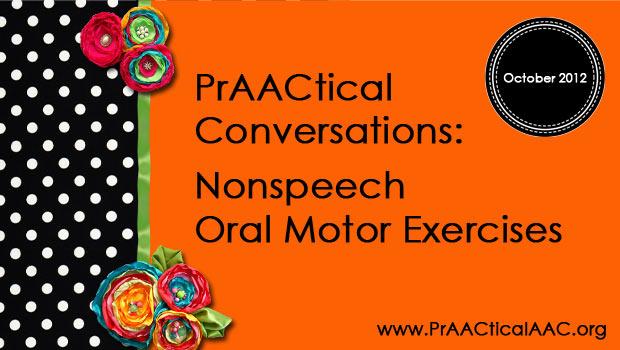
There are some good reasons to use nonspeech oral motor exercises, like blowing, puckering, tongue lateralization, and stretching. For a period of time, I used resistance exercises extensively with one client to improve the resting posture of his articulators and help him keep his mouth closed. Good for hygiene and to reduce his exposure to germs. Using these strategies, lots of children have gained strength and control that allowed them to better bite, chew, and swallow their food. Oral motor exercises can result in some meaningful gains. According to the research, however, improved speech articulation is not among them. There have been a number of studies on this approach, including some strong systematic reviews by McCauley and others. This summary by Dr. Greg Lof (Chair of the Department of Communication Sciences and Disorders at Massachusetts General Hospital Institute of Health Professions) is a few years old but is worth another... [Read More...]
October 12, 2012
by Carole Zangari -
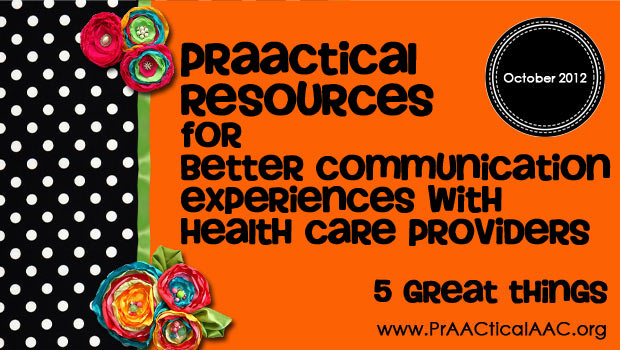
Being sick is no fun, but when you can’t communicate effectively with your healthcare provider, it can be disastrous. Here are some resources that SLPs can use to help promote effective communication and prevent adverse affects. Accommodations Cards: One of the simplest things we can do to help healthcare providers understand the needs of a person who uses AAC, is to give some basic information on an accommodations card. Health Bridges is a project of the Western Pennsylvania Initiative to support individuals who have hearing and vision loss. Their website includes a section that allows you to create quick accommodations cards for this population and serve as a good example for ones that you can make on your own. Accommodations cards don’t solve all the problems, but they’re a quick and easy way to make a start. Patient-Provider Communication Website: Amazing array of information and resources from around the world.... [Read More...]
October 4, 2012
by Carole Zangari -
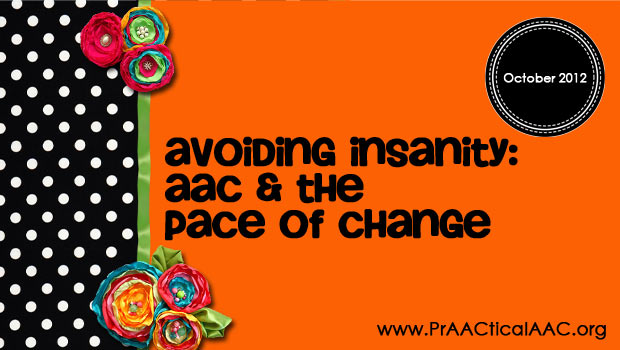
Although the field of AAC emerged only in the last few decades, the notion of communicating in alternative ways is centuries old. In classical times, the use of manual communication by deaf individuals was referred to by Plato and documented in Europe during the Middle Ages. In North America, American Indian Hand Talk evolved over generations to allow cross-cultural communication between speakers of diverse languages. As a clinical/educational field, AAC has been described as evolving through a “bottom-up” mechanism. Individuals with congenital conditions that prevented the development of intelligible speech invented their own communication systems long before teachers, therapists, and clinicians formalized instruction in alternative modes of expression. AAC users growing up in the forties and fifties tell of communicating through grunts, vocalizations, “air writing,” and eye movements, which, though effective in some contexts, were maddening in their limitations. Individuals who were fortunate enough to have access to habilitative and... [Read More...]
July 11, 2012
by Carole Zangari -
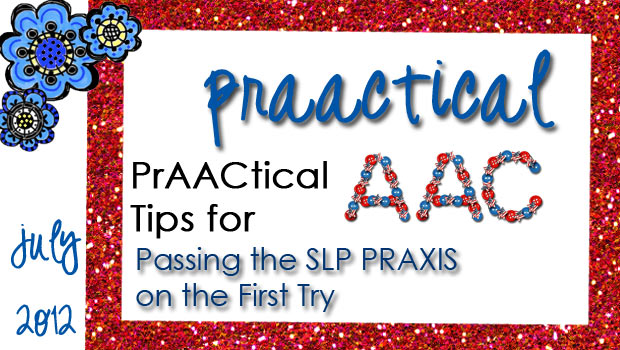
The SLP PRAXIS Exam: No big deal or VERY big deal? You’ll find graduate students and clinical fellows in each camp. Yes, there are lots of new grads who did well on it and swear that they hardly studied. We cheer loudly to welcome them to our ranks. There are others, however, who quietly regret not having gone the extra mile to prepare. We hate regrets, so our SLP PRAXIS prep posts are geared for those who want an extra measure of safety when they go in to take their exam. – In Part 1 and Part 2, we talked about getting prepared and setting a study schedule for the SLP PRAXIS. In this post, we wanted to share some resources that have been helpful to our students. — Online Flashcards There are many sites that offer the ability for users to create flashcards, use them to study, and/or print... [Read More...]
June 24, 2012
by Carole Zangari -
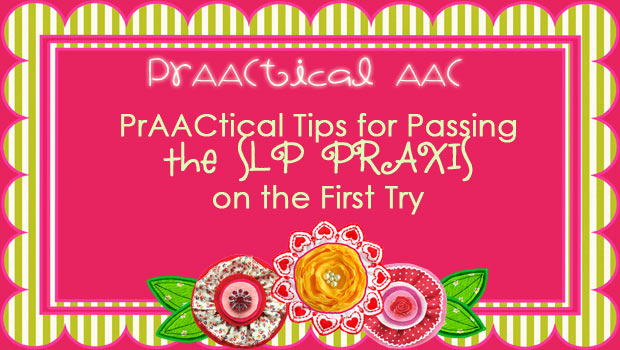
In today’s post, we’re taking a big detour. For the next few weeks, some of our Sunday posts will deviate a bit from the world of AAC, AT, and disability and plunge into the world of the graduate student SLP. Every job has ‘other duties as assigned’ and part of mine involves helping our graduate students get ready for the SLP PRAXIS exam. At our university, we’ve had a structured review class offered online for almost 10 years and I’ve had the pleasure of being involved with that during its evolution. I frequently get requests from students at other universities to take the class, which we can’t accommodate, and it finally (!) occurred to me to write a blog post with some tips and suggestions. The result is this 3-part series. So…Let’s get this party started! –– Before You Start to Study – 1. Learn about the SLP PRAXIS exam... [Read More...]
June 7, 2012
by Carole Zangari -
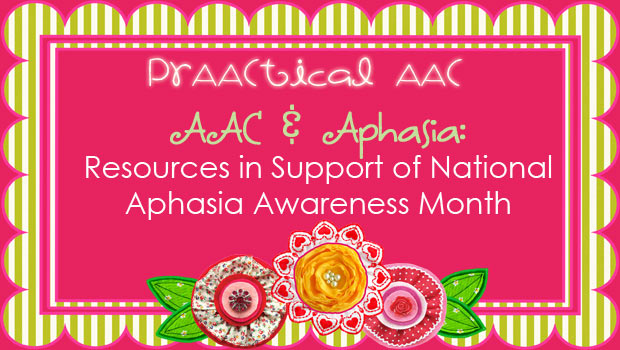
June is National Aphasia Awareness Month here in the US and there is no better time to share some wonderful resources on using AAC with people who have aphasia. – – Things to Do In Support of Aphasia Awareness Read this article on AAC and aphasia by Dr. Joanne Lasker and Dr. Kathryn Garrett Download some AAC Assessment Materials, also by Drs. Lasker and Garrett View a recorded webcast on a visual scene AAC project for people with aphasia from the University of Nebraska and free templates for visual scenes Primary Progressive Aphasia (PPA) is a less common form of the disorder and leads to a gradual reduction in language abilities. You can learn more about it here. View a recorded webcast on PPA by Dr. Melanie Fried Oken. Check out these free apps designed specifically for people with aphasia. Download Small Talk AAC apps (free) for people with... [Read More...]
May 24, 2012
by Carole Zangari -
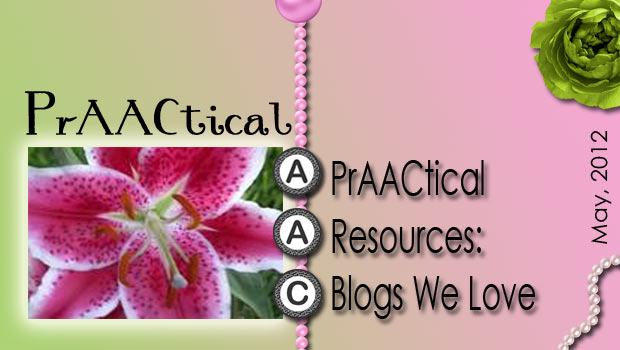
Our BHSM Strategy of the Month has focused on developing our Professional Learning Network, and in this past week we’ve shared some of our favorite internet sites. We can’t finish out the topic, though, without mentioning some of places where we spend time each week. When I first started following blogs by other SLPs, K-12 educators, and professors, I had no idea how much content was out there. Over the years, I’ve become more and more thankful for the wealth of information these bloggers so generously provide. Like anything else, blogs are a varied lot – some good, some not so good, and a few seriously excellent ones. – Here is ASHA’s 2012 list of the best blogs in SLP and some of our favorite blogs for AAC, AT, and tech-related content: Jane Farrall (http://www.janefarrall.com/blog/) Teaching Learners with Multiple Special Needs (http://teachinglearnerswithmultipleneeds.blogspot.com/) Speech Techie (http://www.speechtechie.com/) The Speech Dudes (http://speechdudes.wordpress.com/) Spectronics (https://www.spectronicsinoz.com/blog/)... [Read More...]









